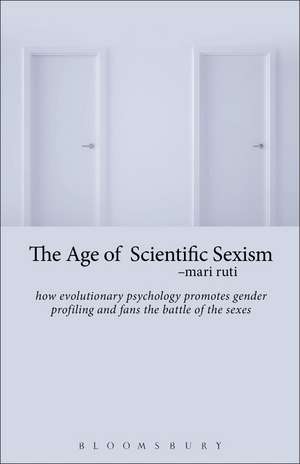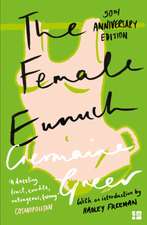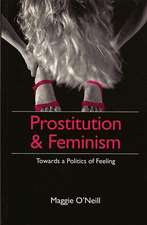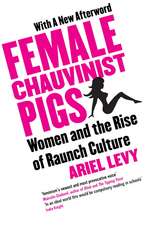The Age of Scientific Sexism: How Evolutionary Psychology Promotes Gender Profiling and Fans the Battle of the Sexes
Autor Professor Mari Rutien Limba Engleză Paperback – 29 iul 2015
| Toate formatele și edițiile | Preț | Express |
|---|---|---|
| Paperback (1) | 190.50 lei 6-8 săpt. | |
| Bloomsbury Publishing – 29 iul 2015 | 190.50 lei 6-8 săpt. | |
| Hardback (1) | 830.20 lei 6-8 săpt. | |
| Bloomsbury Publishing – 29 iul 2015 | 830.20 lei 6-8 săpt. |
Preț: 190.50 lei
Preț vechi: 222.05 lei
-14% Nou
Puncte Express: 286
Preț estimativ în valută:
36.46€ • 39.59$ • 30.62£
36.46€ • 39.59$ • 30.62£
Carte tipărită la comandă
Livrare economică 22 aprilie-06 mai
Preluare comenzi: 021 569.72.76
Specificații
ISBN-13: 9781628923797
ISBN-10: 1628923792
Pagini: 224
Dimensiuni: 140 x 216 x 18 mm
Greutate: 0.3 kg
Editura: Bloomsbury Publishing
Colecția Bloomsbury Academic
Locul publicării:New York, United States
ISBN-10: 1628923792
Pagini: 224
Dimensiuni: 140 x 216 x 18 mm
Greutate: 0.3 kg
Editura: Bloomsbury Publishing
Colecția Bloomsbury Academic
Locul publicării:New York, United States
Caracteristici
Shows that evolutionary psychology functions as the scientific arm of a conservative backlash against the widespread renegotiation of gender roles
Notă biografică
Mari Ruti is Professor of Critical Theory at the University of Toronto, Canada, and Director of Graduate Studies and Visiting Professor of Studies of Women, Gender, and Sexuality at Harvard University, USA. She is the author of five academic books, including The Summons of Love (2011), The Singularity of Being: Lacan and the Immortal Within (2012), and The Call of Character: Living a Life Worth Living (2013). She has also published a trade book: The Case for Falling in Love: Why We Can't Control the Madness of Love - and Why That's the Best Part (2011).
Cuprins
Introduction 1. The Myopia of Men versus Women 2. The Ideology of Gender Difference 3. The Arrogance of the Backlash 4. The Downfall of the Coy Female 5. The Cruelty of Optimism Conclusion
Recenzii
With wit and directness, Ruti (philosophy, Univ. of Toronto) deconstructs popular accounts of evolutionary psychology regarding sex and gender. Being an outsider to the field of evolutionary psychology (her field is critical theory), Ruti positions herself as a nonspecialist reader and analyzes understandings of sex and gender as developed in literature targeting that group of nonspecialists. In the first two chapters, she outlines the standard narrative of sexuality and gender, as delivered in popular work on evolutionary psychology, by examining the work of Robert Wright and David Buss. In chapters 3 and 4, she uses the work of Geoffrey Miller and of Christopher Ryan and Cacilda Jethá to outline some of the contemporary modifications of the standard narrative. In the last chapter Ruti proposes that current evolutionary arguments promote the mainstream understanding of mating behavior as a pillar for heteronormativity in terms of both reproduction and marriage. The author is insightful and clever in delineating the ideological implications of the logical and empirical limitations of evolutionary psychology, especially as presented to the general public. Interesting and intellectually stimulating, this book is a must read for everyone interested in psychology, gender, and sexuality studies. Summing Up: Essential. Upper-division undergraduates, graduate students, researchers, faculty, and professionals.
[Evolutionary Psychology] advocates and researchers claim that the ways in which (straight) men and women relate, pair off, mate, and pass on their genes have their roots in ahistorical, static traits supposedly shared with cavemen and cavewomen . As Ruti explains, when the "strength" of certain traits also happens to line up with gender stereotypes that would have been right at home in the 1950s, things seem a little too pat, often to the point of this "science" fitting neatly into status-quo, retrograde ideas about how men and women act when it comes to love and sex . reading Ruti's takedown of evo psych is akin to listening to the world's most delightful gender-studies tour guide . The Age of Scientific Sexism manages to be informative, entertaining, and persuasive in its exploration of a "science" that is anything but.
The Age of Scientific Sexism tracks the insidious migration of social Darwinism from a largely discredited academic sub-discipline to a mass-marketed area of pop psychology. Passionate and personal in tone, the book exposes the antiquated gender scripts and lazy science that flourish in the field of evolutionary psychology-and why it's important to resist its patriarchal seductions.
The Age of Scientific Sexism sneaks up on you: it starts with an important critique of evolutionary psychology-one that every Introductory Psychology student should read-and subtly opens to a robust queering of straight sex and an unabashed treatise on the truth of humanity's wide-spectrum sexuality. Mari Ruti's reflections unmask the empirical and logical shortcomings of evolutionary psychology, particularly in their popularized guise, showing how we have instantiated shame yet again in current discourses of sex. This is a feminist issue, a psychological issue, but also one concerned with an ethics of love, desire, and passion, with which every person lives with immediately and concretely. This book makes you think. I thank Mari Ruti for it.
A bold, fresh take on gender with a dagger straight to the heart of the societal scripts that promise happiness but too often undermine it. This book is a brilliant read that will leave you feeling smarter and more emboldened to lead your best and most passionate life.
Evolutionary psychology has offered a way of thinking about gender differences in sex, desire, and romance that has been tremendously influential. The standard narrative has infiltrated some of the most popular self-help books (such as John Gray's Men are from Mars, Women are from Venus) and has been perpetrated so relentlessly that it has become part of the conventional wisdom of our time. Mari Ruti, a professor of critical theory at the University of Toronto, isn't buying it. ... She blows giant holes in some of the most influential studies academics cite in support of the standard narrative. ... She shows readers what is exaggerated in the standard narrative and what is marginalized or ignored. ... In a bravura analysis, Ruti shows how the stereotyping and stigmatizing of single people (including single parents) is part of the package of evolutionary psychology and its standard narrative. So is the glorifying of traditional marriage. ... The Age of Scientific Sexism is a smart, compelling, thoughtful read.
[Evolutionary Psychology] advocates and researchers claim that the ways in which (straight) men and women relate, pair off, mate, and pass on their genes have their roots in ahistorical, static traits supposedly shared with cavemen and cavewomen . As Ruti explains, when the "strength" of certain traits also happens to line up with gender stereotypes that would have been right at home in the 1950s, things seem a little too pat, often to the point of this "science" fitting neatly into status-quo, retrograde ideas about how men and women act when it comes to love and sex . reading Ruti's takedown of evo psych is akin to listening to the world's most delightful gender-studies tour guide . The Age of Scientific Sexism manages to be informative, entertaining, and persuasive in its exploration of a "science" that is anything but.
The Age of Scientific Sexism tracks the insidious migration of social Darwinism from a largely discredited academic sub-discipline to a mass-marketed area of pop psychology. Passionate and personal in tone, the book exposes the antiquated gender scripts and lazy science that flourish in the field of evolutionary psychology-and why it's important to resist its patriarchal seductions.
The Age of Scientific Sexism sneaks up on you: it starts with an important critique of evolutionary psychology-one that every Introductory Psychology student should read-and subtly opens to a robust queering of straight sex and an unabashed treatise on the truth of humanity's wide-spectrum sexuality. Mari Ruti's reflections unmask the empirical and logical shortcomings of evolutionary psychology, particularly in their popularized guise, showing how we have instantiated shame yet again in current discourses of sex. This is a feminist issue, a psychological issue, but also one concerned with an ethics of love, desire, and passion, with which every person lives with immediately and concretely. This book makes you think. I thank Mari Ruti for it.
A bold, fresh take on gender with a dagger straight to the heart of the societal scripts that promise happiness but too often undermine it. This book is a brilliant read that will leave you feeling smarter and more emboldened to lead your best and most passionate life.
Evolutionary psychology has offered a way of thinking about gender differences in sex, desire, and romance that has been tremendously influential. The standard narrative has infiltrated some of the most popular self-help books (such as John Gray's Men are from Mars, Women are from Venus) and has been perpetrated so relentlessly that it has become part of the conventional wisdom of our time. Mari Ruti, a professor of critical theory at the University of Toronto, isn't buying it. ... She blows giant holes in some of the most influential studies academics cite in support of the standard narrative. ... She shows readers what is exaggerated in the standard narrative and what is marginalized or ignored. ... In a bravura analysis, Ruti shows how the stereotyping and stigmatizing of single people (including single parents) is part of the package of evolutionary psychology and its standard narrative. So is the glorifying of traditional marriage. ... The Age of Scientific Sexism is a smart, compelling, thoughtful read.














